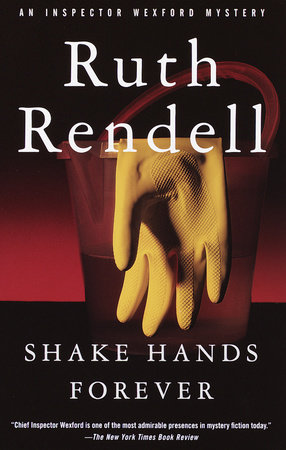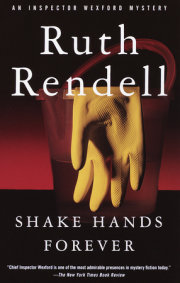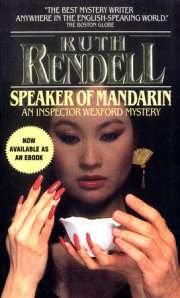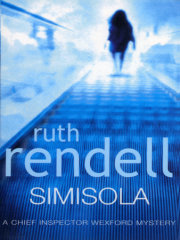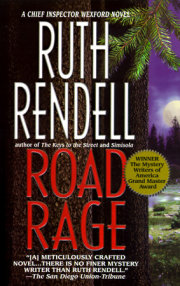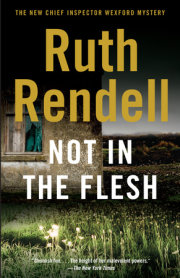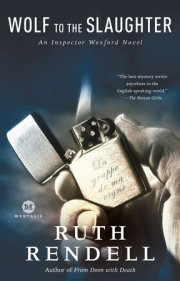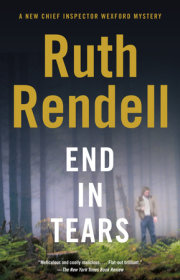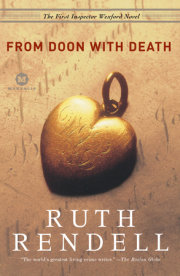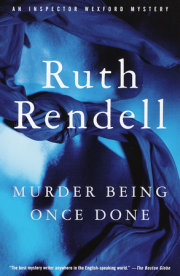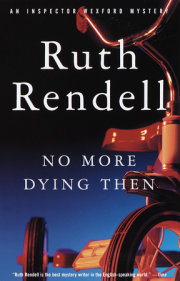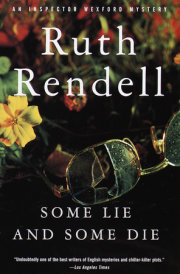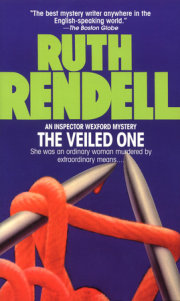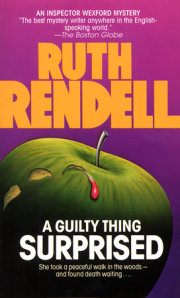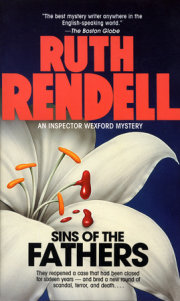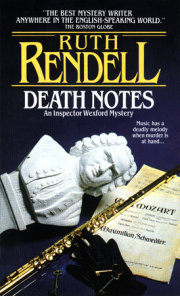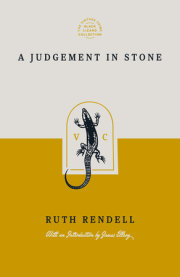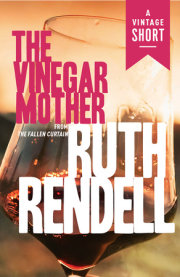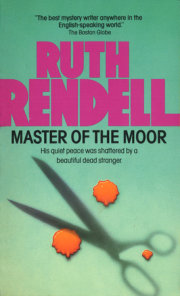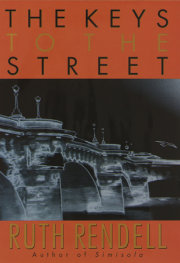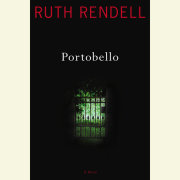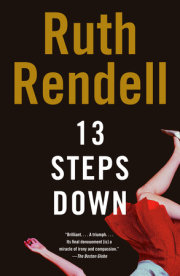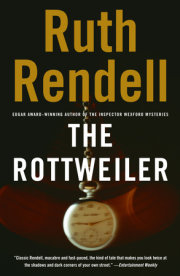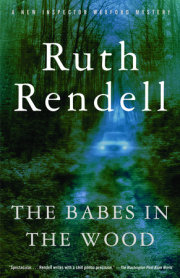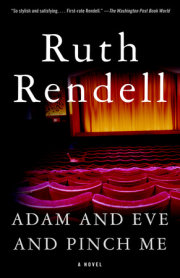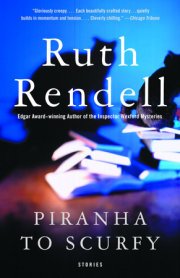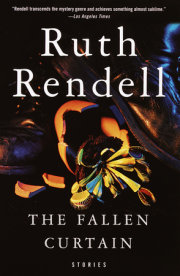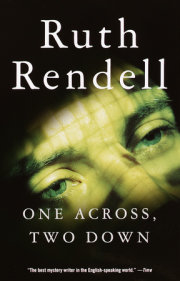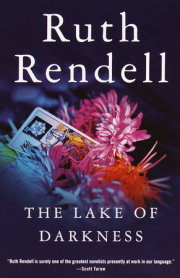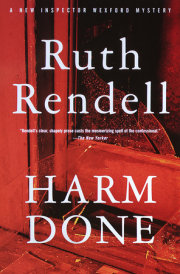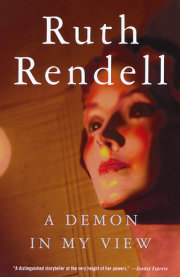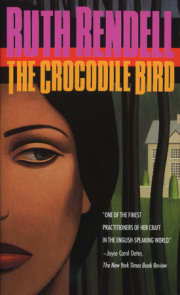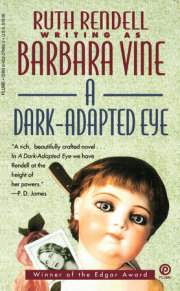1
The woman standing under the departures board at Victoria station had a flat rectangular body and an iron-hard rectangular face. A hat of fawn-coloured corrugated felt rather like a walnut shell encased her head, her hands were gloved in fawn-coloured cotton, and at her feet was the durable but scarcely used brown leather suitcase she had taken on her honeymoon forty-five years before. Her eyes scanned the scurrying commuters while her mouth grew more and more set, the lips thinning to a hairline crack.
She was waiting for her son. He was one minute late and his unpunctuality had begun to afford her a glowing satisfaction. She was hardly aware of this pleasure and, had she been accused of it, would have denied it, just as she would have denied the delight all failure and backsliding in other people brought her. But it was present as an undefined sense of well-being that was to vanish almost as soon as it had been born and be succeeded on Robert's sudden hasty arrival by her usual ill-temper. He was so nearly on time as to make any remarks about his lateness absurd, so she contented herself with offering her leathery cheek to his lips and saying:
'There you are then.'
'Have you got your ticket?' said Robert Hathall.
She hadn't. She knew that money had been tight with him for the three years of his second marriage, but that was his fault. Paying her share would only encourage him.
'You'd better go and get them,' she said, 'unless you want us to miss the train,' and she held even more tightly to her zipped-up handbag.
He was a long time about it. She noted that the Eastbourne train, stopping at Toxborough, Myringham and Kingsmarkham, was due to depart at six twelve, and it was five past now. No fully formed uncompromising thought that it would be nice to miss the train entered her mind, any more than she had consciously told herself it would be nice to find her daughter-in-law in tears, the house filthy and no meal cooked, but once more the seeds of pleasurable resentment began germinating. She had looked forward to this weekend with a deep contentment, certain it would go wrong. Nothing would suit her better than that it should begin to go wrong by their arriving late through no fault of hers, and that their lateness should result in a quarrel between Robert and Angela. But all this smouldered silent and unanalysed under her immediate awareness that Robert was making a mess of things again.
Nevertheless, they caught the train. It was crowded and they both had to stand. Mrs Hathall never complained. She would have fainted before citing her age and her varicose veins as reasons why this or that man should give up his seat to her. Stoicism governed her. Instead, she planted her thick body which, buttoned up in a stiff fawn coat, had the appearance of a wardrobe, in such a way as to prevent the passenger in the window seat from moving his legs or reading his newspaper. She had only one thing to say to Robert and that could keep till there were fewer listeners, and she found it hard to suppose he could have anything to say to her. Hadn't they, after all, spent every weekday evening together for the past two months? But people, she had noticed with some puzzlement, were prone to chatter when they had nothing to say. Even her own son was guilty of this. She listened grimly while he went on about the beautiful scenery through which they would soon pass, the amenities of Bury Cottage, and how much Angela was looking forward to seeing her. Mrs Hathall permitted herself a kind of snort at this last, a two-syllabled grunt made somewhere in her glottis that could be roughly interpreted as a laugh. Her lips didn't move. She was reflecting on the one and only time she had met her daughter-in-law, in that room in Earls Court, when Angela had committed the outrage of referring to Eileen as a greedy bitch. Much would have to be done, many amends be made, before that indiscretion could be forgotten. Mrs Hathall remembered how she had marched straight out of that room and down the stairs, resolving never—never under any circumstances—to see Angela again. It only proved how forbearing she was that she was going to Kingsmarkham now.
At Myringham the passenger by the window, his legs numb, staggered out of the train and Mrs Hathall got his seat. Robert, she could tell, was getting nervous. There was nothing surprising in that. He knew very well this Angela couldn't compete with Eileen as cook and housekeeper and he was wondering just how far below his first wife's standards his second would fall. His next words confirmed her conviction that this was troubling his mind.
'Angela's spent the week spring-cleaning the place to make it nice for you.'
Mrs Hathall was shocked that anyone could make such a statement aloud and in front of a carriage full of people. What she would have liked to say was, firstly, that he should keep his voice down and, secondly, that any decent woman kept her house clean at all times. But she contented herself with a 'I'm sure she needn't put herself out for me' and added repressively that it was time he got her suitcase down.
'It's five minutes yet,' said Robert.
She replied by getting heavily to her feet and struggling with the case herself. Robert and another man intervened to help her, the case nearly fell on to the head of a girl with a baby in her arms, and by the time the train drew to a halt at Kingsmarkham, sending them all staggering and clutching each other, the carriage was in a small uproar.
Out on the platform, Mrs Hathall said, 'That could have been avoided if you'd done as you were asked. You always were obstinate.'
She couldn't understand why be didn't retaliate and fight back. He must be more strung-up than she had thought. To goad him further, she said, 'I suppose we're going to have a taxi?'
'Angela's meeting us in the car.'
Then there wasn't much time for her to say what she had to. She pushed her suitcase at him and took hold of his arm in a proprietory manner. It wasn't that she needed his support or his reassurance, but she felt it essential that this daughter-in-law—how galling and disreputable to have two daughters-in-law!—should, in her first glimpse of them, see them consolidated and arm-in-arm.
'Eileen came in this morning,' she said as they gave up their tickets.
He shrugged absently. 'I wonder you two don't live together.'
'That'd make things easy for you. You wouldn't have to keep a roof over her head.' Mrs Hathall tightened her grip on the arm which he had attempted to jerk away. 'She said to give you her love and say why don't you go round one evening while you're in London.'
'You must be joking,' said Robert Hathall, but he said it vaguely and without much rancour. He was scanning the car park.
Pursuing her theme, Mrs Hathall began 'It's a wicked shame . . .' and then stopped in mid-sentence. A marvellous realization was dawning on her. She knew that car of Robert's, would know it anywhere, he'd had it long enough thanks to the straits that women had brought him to. She too let her sharp eyes rove round the tarmac square, and then she said in a satisfied tone, 'Doesn't look as if she'd put herself out to meet us.'
Robert seemed discomfited. 'The train was a couple of minutes early.'
'It was three minutes late,' said his mother. She sighed happily. Eileen would have been there to meet them all right. Eileen would have been on the platform with a kiss for her mother-in-law and a cheerful promise of the nice tea that awaited them. And her grand-daughter too . . . Mrs Hathall remarked as if to herself but loud enough to be heard, 'Poor little Rosemary.'
It was very unlike Robert, who was his mother's son, to take this sort of aggravation without comment, but again he made none. 'It doesn't matter,' he said. 'It's not all that far.'
'I can walk,' said Mrs Hathall in the stoical tone of one who realizes that there will be worse trials to come and that the first and lightest must be bravely borne. 'I'm quite used to walking.'
Their journey took them up the station approach and Station Road, across Kingsmarkham High Street and along the Stowerton Road. It was a fine September evening, the air aglow with sunset light, the trees heavily foliaged, the gardens bright with the last and finest flowers of summer. But Mrs Hathall, who might have said like the lover in the ballad, 'What are the beauties of nature to me?', disregarded it all. Her wistfulness had given way to certainty. Robert's depression could mean only one thing. This wife of his, this thief, this breaker of a happy marriage, was going to let him down and he knew it.
They turned into Wool Lane, a narrow tree-shaded byway without a pavement. 'That's what I call a nice house,' said Mrs Hathall.
Robert glanced at the detached, between-the-wars villa. 'It's the only one down here apart from ours. A woman called Lake lives there. She's a widow.'
'Pity it's not yours,' said his mother with a wealth of implication. 'Is it much further?'
'Round the next bend. I can't think what's happened to Angela.' He looked at her uneasily. 'I'm sorry about this, Mother. I really am sorry.'
She was so amazed that he should depart from family tradition as actually to apologize for anything, that she could make no answer to this and remained silent until the cottage came into view. A slight disappointment marred her satisfaction, for this was a house, a decent though old house of brown brick with a neat slate roof. 'Is this it?'
He nodded and opened the gate for her. Mrs Hathall observed that the garden was untended, the flower-beds full of weeds and the grass inches high. Under a neglected-looking tree lay a scattering of rotten plums. She said, 'Hmm,' a noncommittal noise characteristic of her and signifying that things were turning out the way she expected. He put the key in the front-door lock and the door swung open. 'Come along in, Mother.'
He was certainly upset now. There was no mistaking it. She knew that way he had of compressing his lips while a little muscle worked in his left cheek. And there was a harsh nervous note in his voice as he called out, 'Angela, we're here!'
Mrs Hathall followed him into the living room. She could hardly believe her eyes. Where were the dirty teacups, fingermarked gin glasses, scattered clothes, crumbs and dust? She planted herself rectangularly on the spotless carpet and turned slowly round, scrutinizing the ceiling for cobwebs, the windows for smears, the ashtrays for that forgotten cigarette end. A strange uncomfortable chill took hold of her. She felt like a champion who, confident of victory, certain of her own superiority, loses the first set to a tyro.
Robert came back and said, 'I can't think where Angela's got to. She's not in the garden. I'll just go into the garage and see if the car's there. Would you like to go on upstairs, Mother? Your bedroom's the big one at the back.'
Having ascertained that the dining-room table wasn't laid and that there was no sign of preparations for a meal in the immaculate kitchen where the rubber gloves and dusting gloves of household labour lay beside the sink, Mrs Hathall mounted the stairs. She ran one finger along the picture rail on the landing. Not a mark, the woodwork might have been newly painted. The bedroom which was to be hers was as exquisitely clean as the rest of the house, the bed turned down to show candy-striped sheets, one dressing-table drawer open and lined with tissue paper. She noted it all but never once, as one revelation followed another, did she allow this evidence of Angela's excellence to mitigate her hatred. It was a pity that her daughter-in-law should have armed herself with this weapon, a pity and that was all. No doubt her other faults, such as this one of not being here to greet her, would more than compensate for this small virtue.
Mrs Hathall went into the bathroom. Polished enamel, clean fluffy towels, guest soap . . . She set her mouth grimly. Money couldn't have been as tight as Robert made out. She told herself only that she resented his deception, not putting even into thought-words that she was confronting a second deprivation, that of not being able to throw their poverty and the reason for it in their faces. She washed her hands and came out on to the landing. The door to the main bedroom was slightly ajar. Mrs Hathall hesitated. But the temptation to take a look inside and perhaps find a tumbled bed, a mess of squalid cosmetics, was too great to resist. She entered the room carefully.
The bed wasn't tumbled but neatly made. On top of the covers lay a girl face-downwards, apparently deeply asleep. Her dark, rather shaggy, hair lay spread over her shoulders and her left arm was flung out. Mrs Hathall said, 'Hmm,' all her warm pleasure welling back unalloyed. Robert's wife was lying asleep, perhaps even drunk. She hadn't bothered to take off her canvas shoes before collapsing there and she was dressed exactly as she had been that day in Earls Court, probably as she always dressed, in shabby faded blue jeans and a red check shirt. Mrs Hathall thought of Eileen's pretty afternoon dresses and short permed hair, of Eileen who would only have slept in the daytime if she had been at death's door, and then she went over to the bed and stared down, frowning. 'Hmm,' she said again, but this time it was a 'Hmm' of admonition, designed to announce her presence and get an immediate shamed response.
There was none. The genuine anger of the person who feels herself unbearably slighted seized Mrs Hathall. She put her hand on her daughter-in-law's shoulder to shake it. But she didn't shake it. The flesh of that neck was icy cold, and as she lifted the veil of hair, she saw a pallid cheek, swollen and bluish.
Most women would have screamed. Mrs Hathall made no sound. Her body became a little more set and cupboard-like as she drew herself upright and placed her thick large hand to her palpitating heart. Many times in her long life she had seen death, her parents', her husband's, uncles', aunts', but she had never before seen what the purplish mark on that neck showed—death by violence. No thought of triumph came to her and no fear. She felt nothing but shock. Heavily, she plodded across the room and began to descend the stairs.
Robert was waiting at the foot of them. In so far as she was capable of love, she loved him, and in going up to him and placing her hand on his arm, she addressed him in a muted reluctant voice, the nearest she could get to tenderness. And she used the only words she knew for breaking this kind of bad news.
'There's been an accident. You'd best go up and see for yourself. It's—it's too late to do anything. Try and take it like a man.'
He stood quite still. He didn't speak.
'She's gone, Robert, your wife's dead.' She repeated the words because he didn't seem to take them in. 'Angela's dead, son.'
A vague uncomfortable feeling came over her that she ought to embrace him, speak some tender word, but she had long ago forgotten how. Besides, she was shaking now and her heart was pumping irregularly. He had neither paled nor flushed. Steadily he walked past her and mounted the stairs. She waited there, impotent, awe-stricken, rubbing her hands together and hunching her shoulders. Then he called out from above in a harsh but calm voice:
'Phone the police, Mother, and tell them what's happened.'
She was glad of something to do, and finding the phone on a low table under a bookshelf, she set her finger to the nine slot in the dial.
2
He was a tall man, carrying insufficient weight for his wide frame. And he had an unhealthy look, his belly sagging a little, his skin a mottled red. Though still black, his hair was thinning and dry, and his features were bold and harsh. He sat in an armchair, slumped as if he had been injured and then flung there. By contrast, his mother sat upright, her solid legs pressed close together, her hands palm-downwards on her lap, her hard eyes fixed on her son with more of sternness than sympathy.
Chief Inspector Wexford thought of those Spartan mothers who preferred seeing their sons brought home on their shields to knowing they were taken captive. He wouldn't have been surprised if she had told this man to pull himself together, but she hadn't yet uttered a word or made any sign to himself and Inspector Burden beyond giving them a curt nod when admitting them to the house. She looked, he thought, like an old-style prison wardress or mistress of a workhouse.
From upstairs the footfalls of other policemen could be heard, passing to and fro. The woman's body had been photographed where it lay, had been identified by the widower and removed to the mortuary. But the men still had much to do. The house was being examined for fingerprints, for the weapon, for some clue as to how this girl had met her death. And it was a big house for a cottage, with five good-sized rooms apart from the kitchen and the bathroom. They had been there since eight and now it was nearly midnight.
Wexford, who stood by a table on which lay the dead woman's driving licence, purse and the other contents of her handbag, was examining her passport. It identified her as a British subject, born in Melbourne, Australia, thirty-two years old, occupation housewife, hair dark brown, eyes grey, height five feet five inches, no distinguishing marks. Angela Margaret Hathall. The passport was three years old and had never been used to pass any port. The photograph in it bore about as much resemblance to the dead woman as such photographs usually bear to their subjects.
'Your wife lived alone here during the week, Mr Hathall?' he said, moving away from the table and sitting down.
Hathall nodded. He answered in a low voice not much above a whisper. 'I used to work in Toxborough. When I got a new job in London I couldn't travel up and down. That was in July. I've been living with my mother during the week, coming home for weekends.'
'You and your mother arrived here at seven-thirty, I think?'
'Twenty past,' said Mrs Hathall, speaking for the first time. She had a harsh metallic voice. Under the South London accent lay a hint of North Country origins.
'So you hadn't seen your wife since—when? Last Sunday? Monday?'
'Sunday night,' said Hathall. 'I went to my mother's by train on Sunday night. My—Angela drove me to the station. I—I phoned her every day. I phoned her today. At lunchtime. She was all right.' He made a breath-catching sound like a sob, and his body swayed forward. 'Who—who would have done this? Who would have wanted to kill—
Angela?'
The words had a stagy ring, a false sound, as if they had been learned from some television play or cliché-ridden thriller. But Wexford knew that grief can sometimes only be expressed in platitudes. We are original in our happy moments. Sorrow has only one voice, one cry.
He answered the question in similarly hackneyed words. 'That's what we have to find out, Mr Hathall. You were at work all day?'
'Marcus Flower, Public Relations Consultants. Half Moon Street. I'm an accountant.' Hathall cleared his throat. 'You can check with them that I was there all day.'
Wexford didn't quite raise his eyebrows. He stroked his chin and looked at the man in silence. Burden's face gave nothing away, but be could tell the inspector was thinking the same thought as his own. And during this silence Hathall, who had uttered this last sentence almost with eagerness, gave a louder sob and buried his face in his hands.
Rigid as stone, Mrs Hathall said, 'Don't give way, son. Bear it like a man.'
But I must feel it like a man . . . As the bit from
Macbeth came into Wexford's mind, he wondered fleetingly why he felt so little sympathy for Hathall, why he wasn't moved. Was he getting the way he'd always sworn he wouldn't get? Was he getting hard and indifferent at last? Or was there really something false in the man's behaviour that gave the lie to these sobs and this abandonment to grief? Probably he was just tired, reading meanings where there were none; probably the woman had picked up a stranger and that stranger had killed her. He waited till Hathall had taken his hands away and raised his face.
'Your car is missing?'
'It was gone from the garage when I got home.' There were no tears on the hard thin cheeks. Would a son of that flint-faced woman be capable of squeezing out tears?
'I'll want a description of your car and its number. Sergeant Martin will get the details from you in a minute.' Wexford got up. 'The doctor has given you a sedative, I believe. I suggest you take it and try and get some sleep. In the morning I should like to talk to you again, but there's very little more we can do tonight.'
Mrs Hathall shut the door on them in the manner of one snapping 'Not today, thanks' at a couple of hawkers. For a moment or two Wexford stood on the path, surveying the place. Light from the bedroom windows showed him a couple of lawns that hadn't been mown for months and a bare plum tree. The path was paved but the drive which ran between the house wall and the right-hand fence was a strip of concrete.
'Where's this garage he was talking about?'
'Must be round the back,' said Burden. 'There wasn't room to build a garage on the side.'
They followed the drive round the back of the cottage. It led them to an asbestos hut with a felt roof, a building which couldn't be seen from the lane.
'If she went for a drive,' said Wexford, 'and brought someone back with her, the chances are they got the car into this garage without a soul seeing them. They'd have gone into the house by the kitchen door. We'll be lucky if we find anyone who saw them.'
In silence they regarded the moonlit empty fields that mounted towards wooded hills. Here and there, in the distance, an occasional light twinkled. And as they walked back towards the road, they were aware of how isolated the house was, how secluded the lane. Its high banks, crowned by massive overhanging trees, made it a black tunnel by night, a sylvan unfrequented corridor by day.
'The nearest house,' said Wexford, 'is that place up by the Stowerton Road, and the only other one is Wool Farm. That's a good half-mile down there.' He pointed through the tree tunnel and then he went off to his car. 'We can say good-bye to our weekend,' he said. 'See you first thing in the morning.'
The chief inspector's own home was to the north of Kingsmarkham on the other side of the Kingsbrook. His bedroom light was on and his wife still awake when he let himself in. Dora Wexford was too placid and too sensible to wait up for her husband, but she had been baby-sitting for her elder daughter and had only just got back. He found her sitting up in bed reading, a glass of hot milk beside her, and although he had only parted from her four hours before, he went up to her and kissed her warmly. The kiss was warmer than usual because, happy as his marriage was, contented with his lot as he was, it sometimes took external disaster to bring home to him his good fortune and how much be valued his wife. Another man's wife was dead, had died foully. . . . He pushed aside squeamishness, his small-hours sensitivity and, starting to undress, asked Dora what she knew of the occupants of Bury Cottage.
'Where's Bury Cottage?'
'In Wool Lane. A man called Hathall lives there. His wife was strangled this afternoon.'
Thirty years of marriage to a policeman hadn't blunted Dora Wexford's sensibilities or coarsened her speech or made her untender, but it was only natural that she could no longer react to such a statement with the average woman's horror.
'Oh, dear,' she said, and conventionally, 'How dreadful! Is it going to be straightforward?'
'Don't know yet.' Her soft calm voice steadied him as it always did. 'Have you ever come across these people?'
'The only person I've ever come across in Wool Lane is that Mrs Lake. She came to the Women's Institute a couple of times, but I think she was too busy in other directions to bother much with that. Very much a one for the men, you know.'
'You don't mean the Women's Institute blackballed her?' said Wexford in mock-horror.
'Don't be so silly, darling. We're not narrow-minded. She's a widow, after all. I can't think why she hasn't married again.'
'Maybe she's like George the Second.'
'Not a bit. She's very pretty. What
do you mean?'
'He promised his wife on her death-bed that he wouldn't marry again but only take mistresses.' While Dora giggled, Wexford studied his figure in the glass, drawing in the muscles of his belly. In the past year he had lost three stone in weight, thanks to diet, exercise and the terror inspired in him by his doctor, and for the first time in a decade he could regard his own reflection with contentment if not with actual delight. Now he could feel that it had been worth it. The agony of going without everything he liked to eat and drink had been worth while.
Il faut souffrir pour être beau. If only there was something one could go without, some strenuous game one could play, that would result in remedying hair loss . . .
'Come to bed,' said Dora. 'If you don't stop preening yourself, I'll think you're going to take mistresses, and I'm not dead yet.'
Wexford grinned and got into bed. Quite early in his career he had taught himself not to dwell on work during the night, and work had seldom kept him awake or troubled his dreams. But as he switched off the bed lamp and cuddled up to Dora—so much easier and pleasanter now he was thin—he allowed himself a few minutes' reflection on the events of the evening. It could be a straightforward case, it very well could be. Angela Hathall had been young and probably nice to look at. She was childless, and though house-proud, must have found time hanging heavily on her hands during those lonely weekdays and lonely nights. What more likely than that she had picked up some man and brought him back to Bury Cottage? Wexford knew that a woman need not be desperate or a nymphomaniac or on the road to prostitution to do this. She need not even intend infidelity. For women's attitudes to sex, whatever the new thought may hold, are not the same as men's. And though it is broadly true that a man who will pick up an unknown woman is only 'after one thing' and broadly speaking she knows it, she will cling to the generous belief that he wants nothing but conversation and perhaps a kiss. Had this been Angela Hathall's belief? Had she picked up a man in her car, a man who wanted more than that and had strangled her because he couldn't get it? Had he killed her and left her on the bed and then made a getaway in her car?
It could be. Wexford decided he would work along these lines. Turning his thoughts to more pleasant topics, his grandchildren, his recent holiday, he was soon asleep.
Copyright © 2000 by Ruth Rendell. All rights reserved. No part of this excerpt may be reproduced or reprinted without permission in writing from the publisher.

